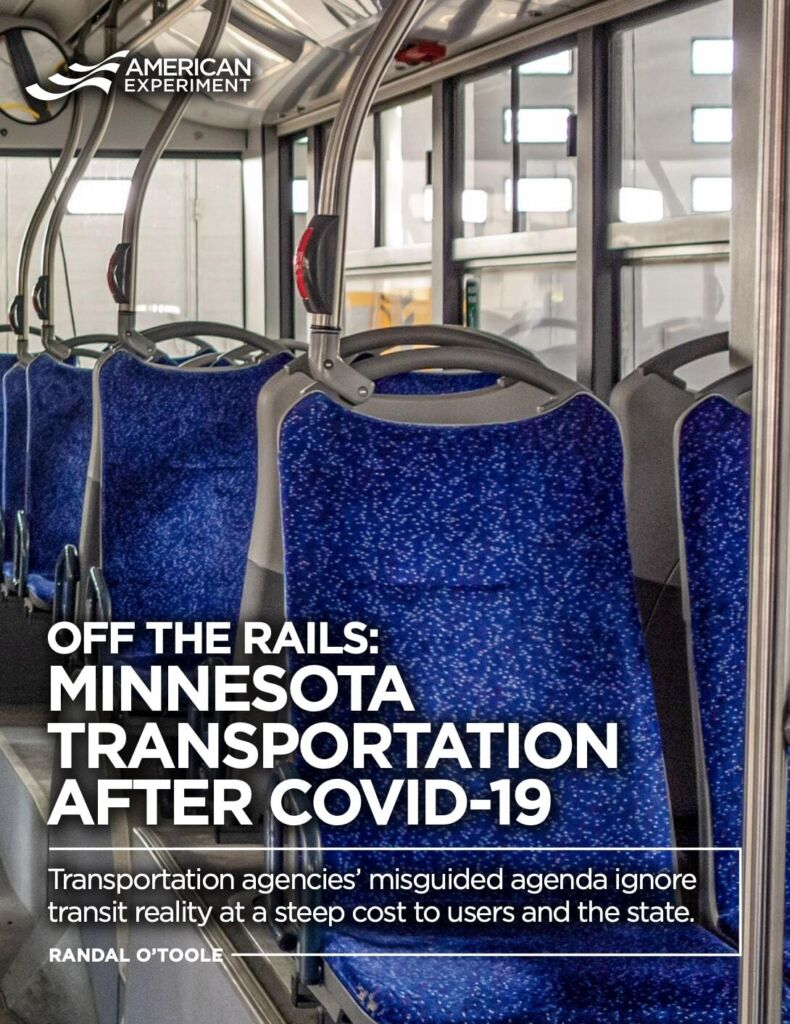Off the Rails: Minnesota Transportation After COVID-19
Transportation agencies’ misguided agenda ignore transit reality at a steep cost to users and the state.
According to national transportation expert Randal O’Toole, Minnesota’s public transportation systems need to reevaluate and reinvent themselves if they’re going to survive.
Data from the U.S. Department of Transportation reveals that the Twin Cities’ light-rail system sees more crimes per billion passenger miles than any other light-rail system in the country; in addition, transit has been the slowest mode of travel to recover from the pandemic, and it is unlikely that it will ever capture more than 75 percent of the ridership it carried in 2019.
This is largely due to ongoing public safety issues and the change in employment patterns in the downtowns of Minneapolis and St. Paul, with more companies adopting work-from-home or hybrid work strategies.
“Plans for light-rail lines, bus-rapid transit, and other improvements should all be re-evaluated in light of lower ridership,” O’Toole writes.
In addition to transit and safety, this report also provides analysis of other aspects of transportation, including Motor Vehicles and Highways, Intercity Travel, Transportation Finance and Light-Rail Myths and Realities. It also chronicles some of Minnesota’s biggest transportation boondoggles, such as the Southwest Light Rail Transit project.
Key findings and recommendations include:
- Transit: Metro Transit should modify the Southwest light-rail project into a dedicated busway, which will cost less and allow for more flexibility.
- Transit: To better serve Twin Cities workers who don’t work in downtown Minneapolis or downtown St. Paul, Metro Transit should revamp its bus system to serve multiple hubs with multiple spokes.
- Safety: Address the lack of rigorous fare enforcement and put fences and turnstiles around every light-rail stop to not allow people inside unless they have paid their fares.
- Safety: MnDOT should build upon data collected by the National Highway Traffic Safety Commission to develop a data-driven system of identifying safety issues on state and local highways, roads, and streets.
- Congestion: After safety, MnDOT should make cost-effective congestion reduction its top priority.
- Low-Income Subsidies: Advocates of transportation equity need to refocus their efforts away from subsidies to transit, which few low-income people use, to providing low-interest loans to low-income people buying cars. Such loans can help people out of poverty by giving them access to far more economic resources than they can reach on mass transit.
- Intercity Travel: Minnesota should reject proposals by Amtrak to help fund increased passenger train services, which are unfair competition to existing bus companies and airlines. Most routes where Amtrak has proposed such state-funded service are already served by buses that offer more frequent service at lower fares than Amtrak. Many are also served by airlines that offer much faster service, often at competitive fares.
- Transportation Finance: Rather than fund transportation out of general funds, Minnesota should find better ways to fund transportation out of user fees, which will result in better infrastructure maintenance and discourage expensive megaprojects that provide few transportation benefits.
Randal O’Toole is the director of the Independence Institute’s Transportation Policy Center and author of six books including Romance of the Rails: Why the Passenger Trains We Love Are Not the Transportation We Need. He previously worked as a Cato Institute Senior Fellow specializing in urban growth, public land, and transportation issues. An Oregon native, O’Toole was educated in forestry at Oregon State University and in economics at the University of Oregon.
Click the “Download PDF” button to read the rest of the report.
